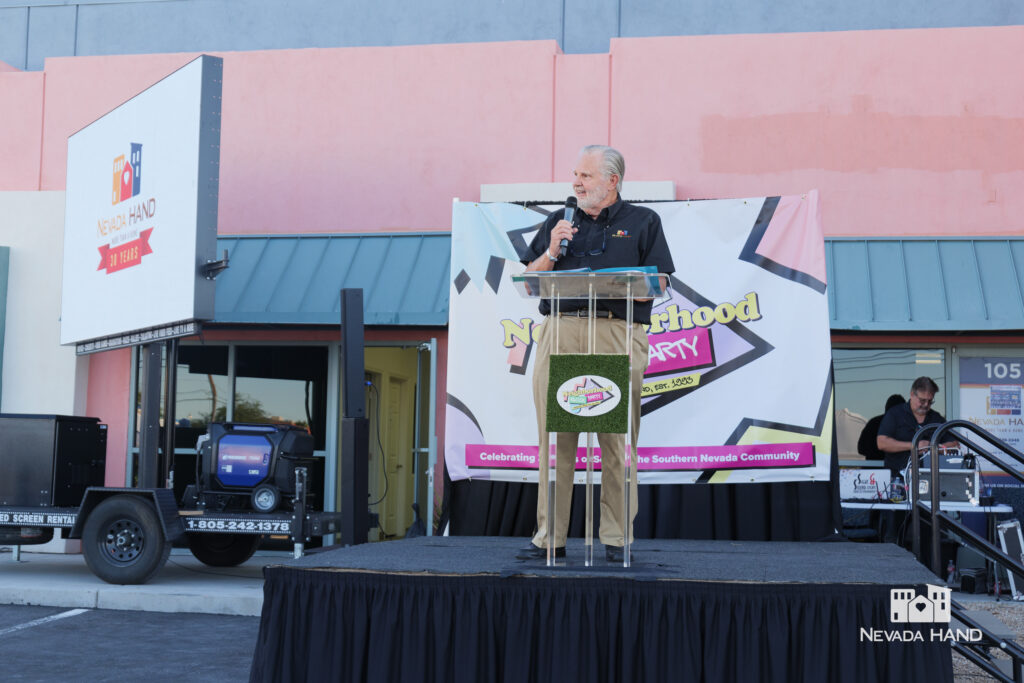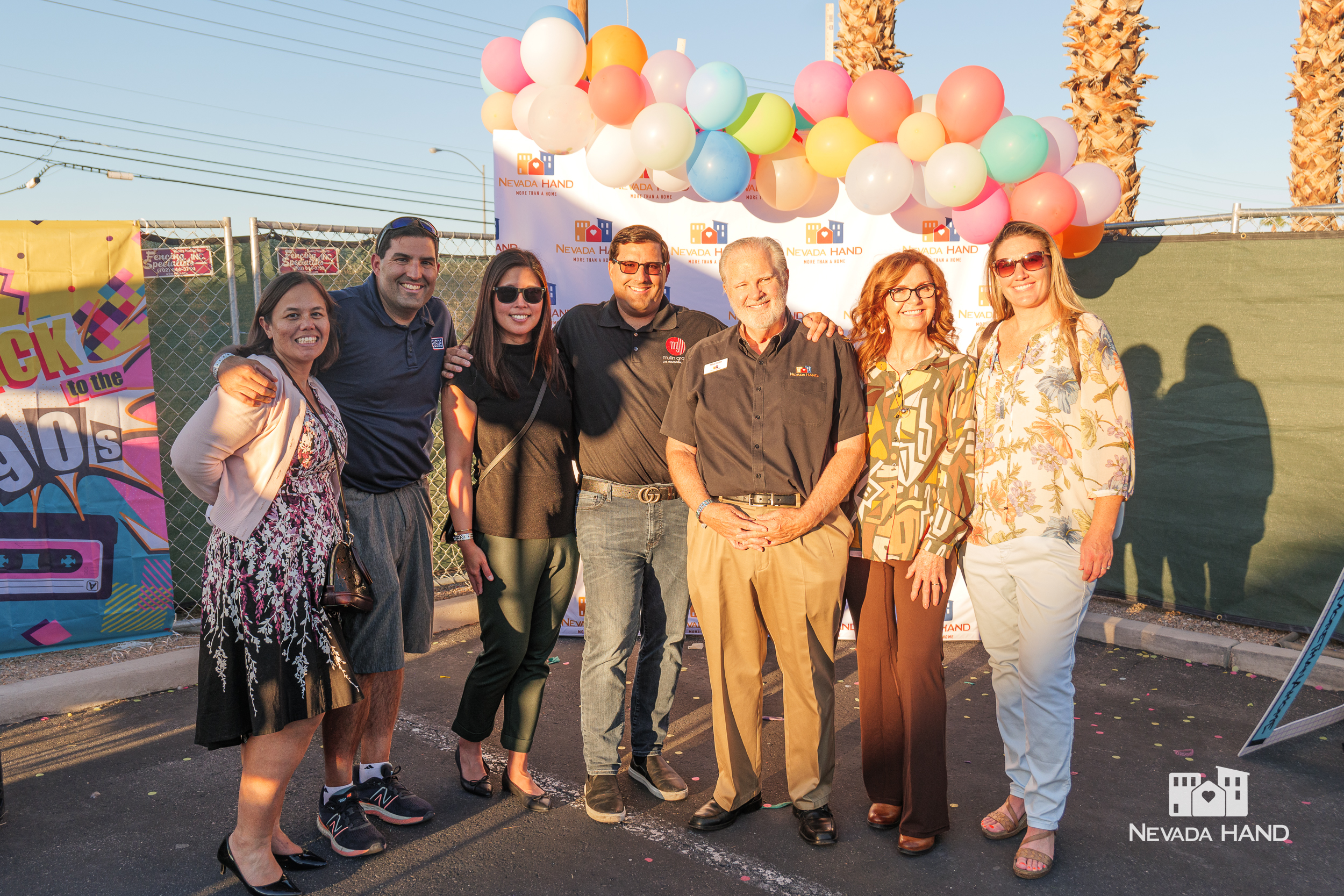

"It's what I call 'divine selfishness.' We make a living by what we get. We make a life by what we give." ~ Mike Mullin, Founder, Nevada HAND
We recently sat down with Nevada HAND's founder, Mike Mullin, to learn more about what inspired him to start this company 30 years ago. Mike moved to Las Vegas in the '70s with a very different career plan in mind, but eventually started a professional journey that satisfied his passion for real estate development and served a pressing community need. He shared some history, reflections on Nevada HAND's growth, and even a little life advice.
Click the sections below to read more!
"Oh I had a wonderful plan. I arrived in Las Vegas and I owned a '65 Chevy cargo van, . . . and I actually lived in my van in what was then The Mint [hotel] parking lot down on Ogden Street for three months. I had 300 bucks to my name, and I wanted to be a professional poker player. I was pretty quickly disabused of that notion, so I . . . went to dealer school at the Fremont Hotel and learned to deal craps. . . . I got my first apartment . . . by the Stratosphere, . . . and I dealt craps for about 14 years."
"The last job I had was at the Tropicana, which was a wonderful job . . . . Craps dealers made pretty good tips and it was pretty good living, [so] I figured I would figure out how to invest that. I got a real estate license and started selling real estate in 1979. And started a family. And for five years I worked two jobs selling real estate in the day and dealing craps at night and trying to finish my college degree.
In 1984. . . I started the very first REO Department. (REO is an acronym for real estate owned.) . . . and became one of the top real estate agents at Americana Group in the mid-eighties. And then, . . . I wanted to. . . learn new things, . . . so I took classes at the National Association Realtors and got a CCIM, which is Certified Commercial Investment Member, which made me a, "commercial expert." . . . I learned a lot about real estate and commercial real estate particularly, and how it worked. At the same time as I was successful, but not very happy or fulfilled . . .. So my journey turned inside, as a search for happiness.
I wanted to find something I really loved doing first, and then I'd figure out how to make money at it . . . .I talked [a friend] into a partnership where he was the money and I was the brains, and we put together a partnership to buy . . . 12 lots. We built fourplexes on them, sold them to developers, and I was infected with the developer bug . . . . About the same time, . . . Citibank was trying to develop nonprofit capacity to build affordable housing . . . . So I was on a team of a nonprofit as an expert; Citibank gave each of these nonprofits $75,000 and about a year's worth of training . . . . I learned about the low-income housing tax credit, which was very underutilized at the time, as well as other grants and things available for affordable housing. And I thought, huh, I love real estate development; there's no competition. . . . So, I thought, I'll start a nonprofit. How hard can it be? Well, it was pretty hard. It took me a year."
"I incorporated . . . in 1993, and it took me all of 1994 to find a credible, arm's-length Board of Directors . . . . We had total assets of $2,110. And that comprised of a $2,000 loan and accounts payable. So our actual fund balance was negative 600 bucks at that time. And it was all just office expenses, basically. No salaries . . . . We got our first Board, we got some small grants in 1995, and we bought a few houses and rehabbed them and then sold them to other nonprofits for group homes . . . We also started out with our first development, which was a home ownership division, another condo project. And we talked the owner into carrying the land for us.
I think we had a property manager and three employees, and all this time from all of 1994 and probably half of 1995, I didn't take a salary . . . . We were living on credit cards . . . and we were basically broke . . . . But I had a vision, and I knew that Nevada HAND was going to be successful . . . . It was more important to get Nevada HAND up off the ground, recognized, moving, [with a] credible board, and to get some wins under our belt.
[Another early project we did], . . . I think it was about 78 units . . . . And because we were so small, we could only do them eight at a time. The bank would only give us construction loans of so much. And then once we sold . . . , they'd let us do the next phase and the next phase . . . . That first homeownership subdivision was called Country Ridge, and we created an association. We had our first Resident Services coordinators on-site who spoke English and Spanish . . . . We had lots of down payment assistance for the first-time home buyers and . . . education programs.
In 1995, we were approached by a company called Lennar, which was a tax credit developer and investor out of Portland, Oregon. And they wanted us to be a nonprofit so they could score more points on an application effectively . . . . I used that to say, we're not just going to make this a name-only thing. I want to materially participate. And one of the ways I want to do that is to oversee the property management. So we will hire a professional property management company until we're able to take it on ourselves, because my eventual goal is that we want to do property management. I had a vision that we wanted to have development fees, contractor fees, property management fees . . . . We wanted to make, rather than pay, those fees out to the for-profit sector — why not keep them in-house, grow the company . . . .
Lennar's construction manager was a gentleman by the name of Bob Feibleman [Nevada HAND's current Executive Vice President of Construction]. Bob and I got to talking, . . . and how I talked him into coming to Las Vegas with a balance sheet like that, I'll never know . . . . But he came on to head up our construction department . . . and came to work for us during the Sierra Pines property. And soon after we came to Stewart Pines downtown . . . [which was] the first development where Nevada HAND stepped up and was the developer, the general contractor, etc."
"Desert Pines, . . . was the very first development, [and] it took several years for that to come to fruition. And when it did, we had a big grand opening . . . . To see the residents moving into a beautiful property with lots of amenities and resident services, it was very rewarding to see that.
Desert Pines was one of the first real quality, affordable housing developments. Affordable housing prior to that had been associated with . . . rundown public housing. I knew if we wanted to be successful, we had to build a nicer product than what was around us . . . . When we can show what a beautiful product we build and how we keep it affordable and how we maintain it over time, that lessens the resistance to our product."
"I thought what would set us apart was the fact that we would be investing in our residents and not just building properties. And so the idea was at the time: transportation, food, resident service coordinators. . . to connect our residents with other nonprofits that had services that would be beneficial to our residents.
It's all about people and the idea that we are in the business of helping people, not in the business of making money or hoarding money. We need to make money to be a business . . . , but we need to invest that money in our residents."
"Never. . . . I was the developer and Bob Feibleman . . . was the construction guy . . . . I was very involved in real estate development, and as it became more and more important to run a company and all aspects of the company, I knew we needed more expertise, more upper management . . . . I loved it for a while, but as we got to a certain size . . . , and I'd been doing it for 20 some years, I . . . got to thinking about how much longer I want to do this . . . because this company is going to grow and it's getting bigger than I have the expertise or the desire to be in charge of . . . . Ken Ladd now at this point was the chairman of the Board. So I talked to him about probably 18 months before I actually retired . . . . And so we talked about it, about a year in advance, we decided to do a search and to look for a new CEO.
[And] we found Audra [Hamernik, Nevada HAND's President and CEO since 2019] . . . . Her interests were very much aligned with our interests. I had seen that she had been very successful in Chicago, and I thought she was a very, very interesting candidate, but I wasn't involved in the search . . . . The selection committee narrowed it down to two candidates, and Audra was eventually chosen. And I think that was the best decision the Board made.
Audra and the team she's brought brings lots of knowledge . . . — not just tax credits, [but] development expertise and working with housing authorities and how to partner with vouchers . . . . I think Audra [was] absolutely the right choice to take Nevada HAND . . . to the next level."
"I'm proud of the concept, the people we serve. I'm proud of the organization and what it's doing. I got to do what I love doing . . . And that's the concept I call divine selfishness . . . . I think everybody needs to do that. They need to find something they love doing. If they love what they're doing, they won't burn out . . . . That's what drove me when I was broke and living on credit cards . . . . You need to find what makes you go, what makes you want to get up in the morning.
And to get a little more philosophical, I think you need to love yourself. And the more you can love yourself, the more you are able to love others . . . . If you try to sacrifice yourself and save others, you're going to burn out . . . . "
"I want to see Nevada Hand being out there and continuing the fight. There's such a huge shortage of affordable housing . . . . I'd like to see Nevada Hand keep on keeping on, and growing responsibly, and continuing to be people–focused and help Southern Nevada with its affordable housing crisis."
Mike Mullin with family members at the 2023 Neighborhood Block Party.

#30for30 #30thAnniversary #MoreThanAHome #AffordableHousing






